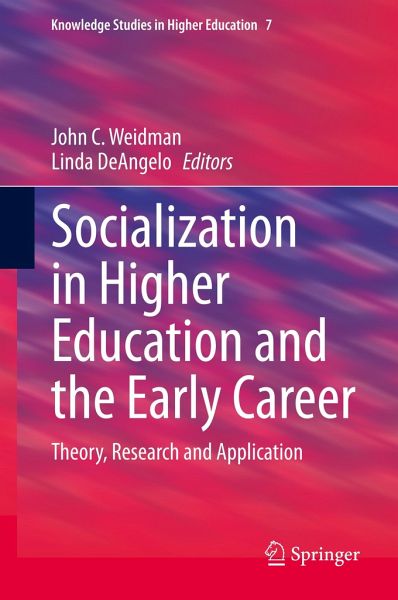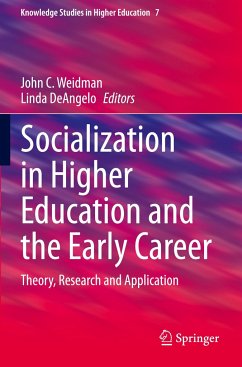
Socialization in Higher Education and the Early Career
Theory, Research and Application
Herausgegeben: Weidman, John C.; DeAngelo, Linda

PAYBACK Punkte
61 °P sammeln!
This book celebrates the contributions of John Weidman and his colleagues to the understanding of student socialization in higher education. It includes innovative chapters reflecting new approaches to higher education student socialization with respect to students of color, gender, STEM, and students in higher education systems outside the USA. Specifically, the book examines socialization between and within in a range of groups, including national, international and minority students, parents, doctoral students, early career faculty, and scholarly practitioners. The book assesses methodologi...
This book celebrates the contributions of John Weidman and his colleagues to the understanding of student socialization in higher education. It includes innovative chapters reflecting new approaches to higher education student socialization with respect to students of color, gender, STEM, and students in higher education systems outside the USA. Specifically, the book examines socialization between and within in a range of groups, including national, international and minority students, parents, doctoral students, early career faculty, and scholarly practitioners. The book assesses methodological approaches and suggests directions for reformulating theory and practice. Using sociological perspectives to address issues and concerns at both the undergraduate and graduate levels, the book gives renewed life to the college impact literature. It includes revisions and expansions of the original Weidman frameworks based on the synthesis of existing research with new work reflectingunique perspectives by a variety of authors.
John Weidman has been an indisputable force in the study and understanding of student socialization in higher education. This new book by Weidman and his coeditor, Linda DeAngelo, represents an undeniably significant and welcomed expansion of the original "Weidman model" of student socialization. In updating and revising the original model, chapter authors give attention to various contemporary issues such as student diversity, gender differences, early career experiences, and internationalism. Whether one samples only some of the articles that constitute this book or reads all of them, the professional payoff will be substantial.
Kenneth A. Feldman, Professor of Sociology, Stony Brook University
John Weidman has made a number of groundbreaking contributions to our understanding of student socialization in postsecondary education. This book, edited with Linda DeAngelo, brings together a group of fine scholars whose contributions will push our understanding even further. It is a significant addition to the college impact literature.
Ernest T. Pascarella, Petersen Chair in Higher Education, University of Iowa
John Weidman has been an indisputable force in the study and understanding of student socialization in higher education. This new book by Weidman and his coeditor, Linda DeAngelo, represents an undeniably significant and welcomed expansion of the original "Weidman model" of student socialization. In updating and revising the original model, chapter authors give attention to various contemporary issues such as student diversity, gender differences, early career experiences, and internationalism. Whether one samples only some of the articles that constitute this book or reads all of them, the professional payoff will be substantial.
Kenneth A. Feldman, Professor of Sociology, Stony Brook University
John Weidman has made a number of groundbreaking contributions to our understanding of student socialization in postsecondary education. This book, edited with Linda DeAngelo, brings together a group of fine scholars whose contributions will push our understanding even further. It is a significant addition to the college impact literature.
Ernest T. Pascarella, Petersen Chair in Higher Education, University of Iowa












